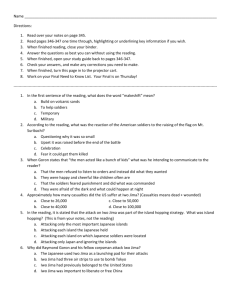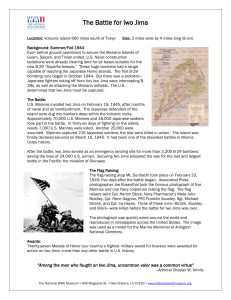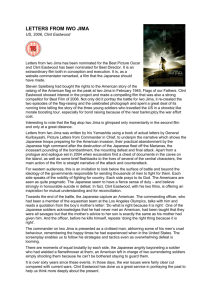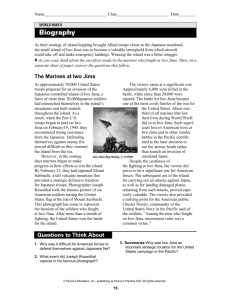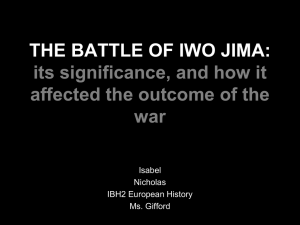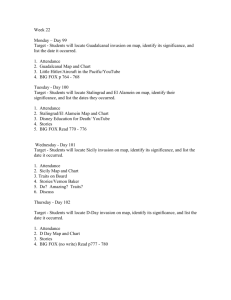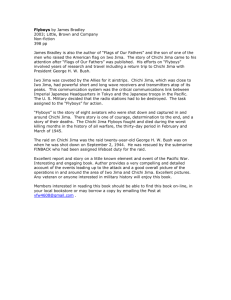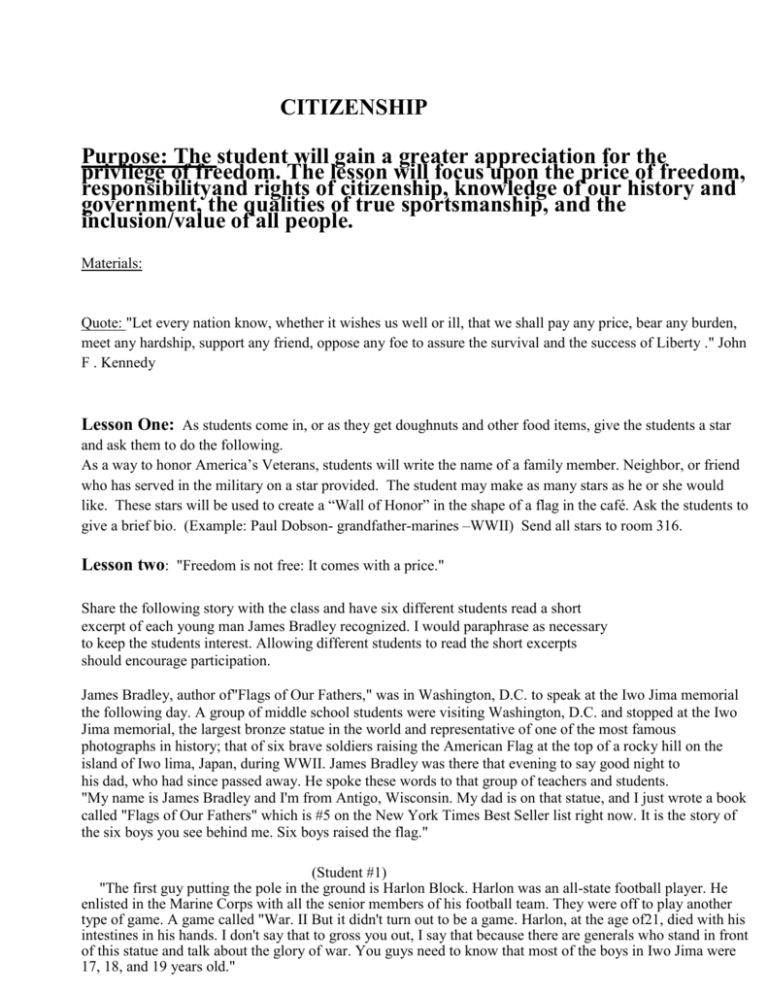
CITIZENSHIP
Purpose: The student will gain a greater appreciation for the
privilege of freedom. The lesson will focus upon the price of freedom,
responsibilityand rights of citizenship, knowledge of our history and
government, the qualities of true sportsmanship, and the
inclusion/value of all people.
Materials:
Quote: "Let every nation know, whether it wishes us well or ill, that we shall pay any price, bear any burden,
meet any hardship, support any friend, oppose any foe to assure the survival and the success of Liberty ." John
F . Kennedy
Lesson One: As students come in, or as they get doughnuts and other food items, give the students a star
and ask them to do the following.
As a way to honor America’s Veterans, students will write the name of a family member. Neighbor, or friend
who has served in the military on a star provided. The student may make as many stars as he or she would
like. These stars will be used to create a “Wall of Honor” in the shape of a flag in the café. Ask the students to
give a brief bio. (Example: Paul Dobson- grandfather-marines –WWII) Send all stars to room 316.
Lesson two: "Freedom is not free: It comes with a price."
Share the following story with the class and have six different students read a short
excerpt of each young man James Bradley recognized. I would paraphrase as necessary
to keep the students interest. Allowing different students to read the short excerpts
should encourage participation.
James Bradley, author of"Flags of Our Fathers," was in Washington, D.C. to speak at the Iwo Jima memorial
the following day. A group of middle school students were visiting Washington, D.C. and stopped at the Iwo
Jima memorial, the largest bronze statue in the world and representative of one of the most famous
photographs in history; that of six brave soldiers raising the American Flag at the top of a rocky hill on the
island of Iwo lima, Japan, during WWII. James Bradley was there that evening to say good night to
his dad, who had since passed away. He spoke these words to that group of teachers and students.
"My name is James Bradley and I'm from Antigo, Wisconsin. My dad is on that statue, and I just wrote a book
called "Flags of Our Fathers" which is #5 on the New York Times Best Seller list right now. It is the story of
the six boys you see behind me. Six boys raised the flag."
(Student #1)
"The first guy putting the pole in the ground is Harlon Block. Harlon was an all-state football player. He
enlisted in the Marine Corps with all the senior members of his football team. They were off to play another
type of game. A game called "War. II But it didn't turn out to be a game. Harlon, at the age of21, died with his
intestines in his hands. I don't say that to gross you out, I say that because there are generals who stand in front
of this statue and talk about the glory of war. You guys need to know that most of the boys in Iwo Jima were
17, 18, and 19 years old."
(Student #2)
(He pointed to the statue) "You see this next guy? That's Rene Gagnon from New
Hampshire. If you took Rene's helmet off at the moment this photo was taken and looked
in the webbing of that helmet, you would find a photograph. ..a photograph of his
girlfriend. Rene put that in there for protection because he was scared. He was 18 years
old. Boys won the battle of lwo Jima. Boys Not old men."
(Student #3)
"The next guy here, the third guy in this tableau, was Sergeant Mike Strank. Mike is
my hero. He was the hero of all these guys. They called him the "old man" because he
was so old. He was already 24. When Mike would motivate his boys in training camp,
he didn't say, 'Let's go kill some Japanese' or 'Let's die for our country.' He knew he was
talking to little boys. Instead he would say, 'You do what I say, and I'll get you home to
your mothers."'
(Student #4)
"The last guy on this side of the statue is Ira Hayes, a Pima Indian from Arizona. Ira
Hayes walked off lwo Jima. He went into the White House with my dad. President
Truman told him, 'You're a hero.' He told reporters, 'How can I feel like a hero when 250
of my buddies hit the island with me and only 27 of us walked off alive?' So you take
your class at school, 250 of you spending a year together having fun, doing everything
together. Then all 250 of you hit the beach, but only 27 of your classmates walk off
alive. That was Ira Hayes. He had images of horror in his mind. Ira Hayes died dead
drunk, face down at the age of32 ...ten years after this picture was taken."
(Student #5)
"The next guy, going around the statue, is Franklin Sousley from Hilltop, Kentucky.A fun-Iovin' hillbilly boy. His best friend, who is now 70, told me, 'Yeah, you know, we
took two cows up on the porch of the Hilltop General Store. Then we strung wire across
the stairs so the cows couldn't get down. Then we fed them Epsom salts. Those cows
crapped all night. ' Yes, he was a fun-Iovin' hillbilly boy. Franklin died on Iwo Jima at
the age of 19. When the telegram came to tell his mother that he was dead, it went to the
Hilltop General Store. A barefoot boy ran that telegram up to his mother's farm. The
neighbors could hear her scream all night and into the morning. The neighbors lived a
quarter of a mile away."
(Student #6)
"The next guy, as we continue to go around the statue, is my dad, John Bradley from
Antigo, Wisconsin, where I was raised. My dad lived unti11994, but he would never give
interviews. When Walter Cronkite's producers, or the New York Times would call, we
were trained as little kids to say, 'No, I'm sorry, sir, my dad's not here. He is in Canada
fishing. No, there is no phone there, sir. No, we don't know when he is coming back.'
My dad never fished or even went to Canada. Usually, he was sitting there right at the
table eating his Campbell's soup. But we had to tell the press that he was out fishing. He
didn't want to talk to the press."
(Conclusion)
You see, my dad didn't see himself as a hero. Everyone thinks these guys are heroes,
'cause they are in a photo and a monument. My dad knew better. He was a medic. John
Bradley from Wisconsin was a caregiver. In Iwo Jima he probably held over 200 boys as
they died. And when boys died in Iwo Jima, they writhed and screamed in pain. When I
was a little boy, my third grade teacher told me that my dad was a hero. When I went
home and told my dad that, he looked at me and said, 'I want you always to remember
that the heroes of Iwo Jima are the guys who did not come back. Did NOT come back.'
So that's the story about six nice young boys. Three died on Iwo lima, and three came
back as national heroes. Overall, 7,000 boys died on Iwo Jima in the worst battle in the
history of the Marine Corps. My voice is giving out, so I will end here. Thank you for
your time. "
The teachers and students alike realized this "wasn't just a big old piece of metal with
a flag sticking out of the top." It is a vivid reminder that we enjoy freedom, but at a great
cost and sacrifice. From the Revolutionary War to the War in Iraq, we must remember
that freedom has and continues to come with a price.
Discussion:
.What responsibilities do we have as a citizen?
. Serving, protecting, building our country are easy responsibilities to address, but
what about obeying our countries laws? (Such as speeding, under age drinking,
etc.)
.Why is voting such a supreme privilege? (Consequences of not voting)
.What thoughts come to mind when you hear "Patriotism?"
. Sometimes people demonstrate their opposition to stances we have taken and
presently take as a country and people? What rights do they have?
We must be careful to realize why people came to America to begin with. Why did
people come to America? (Discuss) America is built upon diverse opinions and thoughts. What
would America be like today, if champions such as Martin Luther King had not voiced and
publicly opposed the contradiction of our own Declaration of Independence that " All men are
created equal"?
Lesson Three:
Taming Our Tongues
Purpose: By the end of this lesson, I want my students to be motivated to
improve their communications and to know several ways to improve.
Note: This lesson has enough material to spread out over several sessions.
Supplies: 1) Two bars of candy for winner of introductory game. 2) A word on a sheet
of paper for each row (same word) for introductory game.
Additional Resources: Overhead and Student Handout.
Hint: Think through the times people have both hurt you and helped you with their
words. Recall some of your most embarrassing verbal blunders. Sharing your personal
stories can bring the lesson alive and make the students more willing to share their own
stories. Also, students will discover that you are affected by people's words, helping
them to learn empathy.
Introductory Game
ACTIVITY: Back Words
Make sure each row (front to back) has an even number of students. Hand out the
same word to every other student in a row, starting with the last person. Tell them that
when you say "Go!" each person with a word in hand should try to spell the word on the
back of the person in front of them. No talking allowed. When the person thinks they
know a letter, they should not say it, but write it down and tell their partner to go to the
next letter. The first person in the class to yell out the word gets a bar of candy, along
with the person who wrote on his/her back.
Debriefing: Communicating your thoughts with words isn't always easy. But cutting off
verbal communication and trying to communicate through other means can be
downright exasperating. Why do you think we sometimes want people to interpret our
feelings without using words? How does that sometimes frustrate us?
You may think that you shouldn't have to tell your boyfriend that you'd rather go to a
quite coffee-shop and talk rather than hang out with the crowd. He should just know by
your sullenness that you're not in the mood for a crowd. But what other ways might your
boyfriend interpret your sullenness? The bottom line? If you want people to know what
you want and feel, make it clear to them in words.
In this lesson we'll talk about the importance of our words and how to improve our
communications.
The Incredible Power of the Tongue
Children are often taught to reply to insults like this: "Sticks and stones (say it with me!)
may break my bones, but words can never hurt me." Do you agree with that statement?
Why or why not? (Let them share.) Regrettably, this saying is far from the truth. Words
are incredibly powerful. Solomon, known for his wisdom for 3,000 years, put it this way,
“The tongue has the power of life and death…”
How do you think people's words can cause death? (Give them time to respond.)
Hitler's motivating speeches brought physical death to thousands. Students have
committed suicide because of the unkind words of others. But how do words cause
emotional death? (People get discouraged, give up, get depressed, etc.)
Let student's share.
So, the bad news is that the tongue is so powerful that it can kill. The good news is that
its power can be used to bring life.
Illustration: One day a schoolteacher asked the assistance of Stevie Morris, a blind
student, to find a mouse in her classroom. For the first time, someone had appreciated
Stevie's unusual ability to hear. This event changed his life. He began to concentrate on
his assets rather than his handicap, and became one of the great pop singers and
songwriters of the 70's. His stage name is Stevie Wonder. His teacher's words brought
him life.
Discussion: Leader: share how someone’s words have either helped or hurt you. Then,
allow students to share how they have seen words either help or destroy people. They
may remember how someone’s words changed their lives, for good or for ill. They may
remember times when their own words helped or hurt others.
The power of words is immense. A well-chosen word has often sufficed to
stop a fleeing army, to change defeat into victory, and to save an empire.
(Emile DeGirardin)
Transition: So, there can be no doubt as to the power of our spoken words. How, then,
can we tame the negative and harness the positive power of the tongue to improve our
relationships?
How to Tame the Tongue
Discussion: We're so used to the way we talk that it's difficult to see our own
communication blunders. It’s much easier to spot poor communication in others than in
ourselves. So, let’s list some of the communication blunders that we see in others
in order to look at ourselves, to see if we're doing the same things. I’ll guarantee you
that if you honestly look at your own life, several of these truths will grab you.
Write down the points that you think you need to work on the hardest. (Have a student
write on the board the communication blunders that students share. If they're having a
hard time coming up with something, have them think through their family
communications, then in the neighborhood, in the lunch room, in an extra-curricular
activity. The below ideas can add to what they get and help you elucidate.
Idea: If your class gets into competition, you might divide the class in half, with each
team sending a person to the blackboard to list as many types of verbal blunders as
they can. Give them about 3 minutes. The winners serve donuts to the losers.)
Don’t you hate it when…
1. ...people say the wrong thing at the wrong time?
Management guru Peter Drucker claimed that 60 percent of all management
problems result from faulty communications.
Large group discussion: Do any of you have humorous examples of verbal blunders
you have either made or heard? How do you think we can avoid this problem? (Get their
ideas.)
Think before you speak. Remember, your words are powerful!
Ask yourself, how will this person respond to what I am about to say?
Be sensitive to the people you are speaking with. Try to put yourself in their
shoes and predict their response to your words.
Notice people's response. Isn’t it amazing how many times you can tell that
someone is obviously either bored or offended by what someone else is saying,
yet the obnoxious offender keeps speaking on the same subject, oblivious to the
listener’s reaction?
Illustration: A high school band member was practicing marching with his squad early
one morning. Seeing a small speck on a girl’s leg, he unthinkingly said, “Get that ugly
piece of grass off your leg!” But it wasn’t a piece of grass. It was a mole! She kept a
band aid over it from then on. And no matter how much he apologized and said he was
just kidding, the damage had been done. How could he have avoided this?
Illustration: On the positive side, Winston Churchhill, one of the greatest men of the
20th century, often labored hard to word, not just his speeches, but his apparently
casual remarks. Someone said that Churchhill spent the best years of his life preparing
impromptu speeches! But his words were powerful, and did much to rally the forces that
led to Hitler's defeat.
Timely, well-crafted statements can touch lives!
So, let's give more thought to our words. Plan them. They are powerful.
Now back to “Don’t you hate it when…"
2. ...people respond from emotion rather than reason?
“Better a patient man than a warrior, a man who controls his temper than
one who takes a city.” (Solomon)
Have you ever said something out of emotion that you later regretted? You wanted to
grab those words and put them back in your mouth, but it was too late? Help me out
here. What are some ideas on controlling our outbursts. (example: count to 10 before
replying, walk away and come back when you're calm…)
3. ...people talk about others behind their backs?
The assassin and the slanderer differ only in the weapon they use; with the
one it is the dagger, with the other the tongue. The latter is worse than the
former, for the first only kills the body, while the other murders the
reputation. (Tyron Edwards)
''Speak ill of no man, but speak all the good you know of everybody.''
(Benjamin Franklin)
Discussion: How many of you have been hurt by slander and gossip? Why do you
think people gossip and slander? (Possible answer: either because they do not like the
person or they try to get others to like them by sharing juicy bits of information.) Yet,
what eventually happens to people who slander and gossip? (They end up in trouble
and often drive people away. No one wants to share their deepest thoughts for fear that
they will one day be made public. If I hear someone constantly running other people
down, I know that he will someday do the same to me. I keep my distance. They can
end up lonely and isolated.)
4. ...people lie?
When a person regularly lies, what affect does it have on them? (People don't trust
them and hesitate to get close to them.)
5. ...people talk too much?
“Even a fool is thought wise if he keeps silent, and discerning if he holds
his tongue." (Solomon)
People who talk too much generally don't know that they talk too much. How can you
know if you talk too much? (Ask family members or friends.) Any ideas for how a person
can cure it?
Rx for the Blabber Mouth:
a. Become truly interested in other people, not just getting other people interested in
you.
b. Practice the "2/3 rule". Try to get others talking 2/3 of the time by asking openended (cannot be answered by a "yes" or "no") questions.
c. Have a friend give you a signal (like a tap on the shoulder) when you're dominating
the conversation.
d. Other ideas?
6. ...people will never admit it when they are wrong?
Illustration: I heard a leader say that he considers one of his worst moments as a time
when he tried to cover up a mistake rather than admit it. People would have respected
him more had he said, "You are right. I was wrong. How do you think I could best
correct this mistake?"
7 . ...people talk incessantly about themselves?
“Let another praise you, and not your own mouth; someone else, and not
your own lips.” (Solomon)
Discussion: Without giving names, how many of you know someone who always talks
about himself? What do you think of that person? Don’t you hate it when somebody
constantly tops every experience you share with a bigger and better experience? Do
people flock to his or her presence?
"You can make more friends in two months by becoming interested in
other people than in 2 years of trying to get other people interested in you."
(Success Expert Dale Carnegie)
8. ...people dwell on the negative?
Begin to look at the bright side of things, and watch you family and friends desire to
spend more time with you.
9. ...people don't listen?
For some people, listening is simply waiting for their turn to speak. They are more
concerned with what they want to say next rather then what the other person is saying.
Few of us seem to realize the incredible importance of listening.
Discussion: What are some ways we can become better listeners? (We have an entire
lesson dedicated to the art of listening.)
CONCLUSION
Idea! Ask for volunteers to prepare a skit that illustrates a lot of the wrong ways to
communicate. Perhaps it could be impromptu. As they demonstrate a wrong way, class
members could raise their hands to guess which bad habits they are practicing.
The quality of our communication will determine a lot of our future success or failure.
Yet, most of us either ignore our faults or don't want to put forth the effort to change.
Illustration: If you play the guitar, (or any instrument, or a sport like golf) do you
remember what it was like when you first started playing? Was it comfortable at first to
play the instrument the right way or throw the ball the right way? Only with great effort
and time were you able to reach the point where you could play with comfort and ease.
Similarly, it’s awkward to try to change lifelong habits of speech. It seems unnatural to
try to get other people talking if your habit is to dominate the conversation. Yet, as
difficult is it is to change old habits of communication, these changes could be some of
the most important you could make in your life.
Action Points: Look over the list of items on the board. ("Don't you hate it when...?) On
your student sheet, star the items that you need to work on. This week, become aware
of good conversationists and poor ones, learning more about how to communicate well.
Lesson 4: An opportunity to make a difference
A video on community service will appear on Channel 6 at 10:40am. The video will discuss the
school wide community service projects coming up. The projects are: Shop with a Mustang, Special
Ed Dance, Field of Dreams, and Relay for Life.
Shop with a Mustang – taking feeder school children that are economically challenged Christmas
shopping.
Special Ed Dance – being a dance partner for a special ed student.
Field of dreams – being a special ed buddy playing baseball on the new leagues being formed by
the City of Acworth
Relay for Life- everyone has been effected with the affects of cancer. We collect money and walk
for 12 hours to defeat cancer.
After the Video, Challenge every student to be an agent of change by giving up a drink for the “shop
with a Mustang” Program. Your Teacher will have a cash tally sheet to complete and place in the
safe.
Copyright April, 2004 by Legacy Educational Resources. All Rights Reserved. Modified to fit
Kennesaw Mountain’s students needs by Billy Richardson. Paid fees for the 2006-2007 school
year.
Taming Our Tongues worksheet
The Incredible Power of the Tongue
"Sticks and stones may break my bones, but words can never hurt me." Do you
agree with that statement? Why or why not?
“The tongue has the power of life and death…” (Solomon)
The power of words is immense. A well-chosen word has often sufficed to
stop a fleeing army, to change defeat into victory, and to save an empire.
(Emile DeGirardin)
How to Tame the Tongue
Don’t you hate it when…
1. ...people say the wrong _______ at the wrong ________?
Management guru Peter Drucker claimed that 60 percent of all management
problems result from faulty communications.
_______ before you speak.
Ask yourself, how will this person _________ to what I am about to say?
Be _________ to the people you are speaking with.
Notice people's _________.
Timely, well-crafted statements can touch lives!
2. ...people respond from ________ rather than ________?
“Better a patient man than a warrior, a man who controls his temper than
one who takes a city.” (Solomon)
3. ...people talk about others behind their ________?
The assassin and the slanderer differ only in the weapon they use; with the
one it is the dagger, with the other the tongue. The latter is worse than the
former, for the first only kills the body, while the other murders the
reputation. (Tyron Edwards)
''Speak ill of no man, but speak all the good you know of everybody.''
(Benjamin Franklin)
4. ...people ________?
When a person regularly lies, what affect does it have on them? (People don't trust
them and hesitate to get close to them.)
5. ...people talk _____ _______?
“Even a fool is thought wise if he keeps silent, and discerning if he holds
his tongue." (Solomon)
Rx for the Blabber Mouth:
a. Become truly _________ in other people, not just getting other people
interested in you.
b. Practice the "_________". Try to get others talking 2/3 of the time by asking
open-ended (cannot be answered by a "yes" or "no") questions.
c. Have a friend give you a __________ (like a tap on the shoulder) when
you're dominating the conversation.
d. Other ideas?
6. ...people will never ________ it when they are wrong?
7 . ...people talk incessantly about __________?
“Let another praise you, and not your own mouth; someone else, and not
your own lips.” (Solomon)
"You can make more friends in two months by becoming interested in
other people than in 2 years of trying to get other people interested in you."
(Success Expert Dale Carnegie)
8. ...people dwell on the ___________?
9. ...people don't __________?
Action Points:
1.
2.
3.
(Copyright August, 1997 by Legacy Educational Resources)


